Floor Screeding Adwick-le-Street South Yorkshire (DN6): If you are restoring a property or basement, are hoping to install underfloor heating or have an uneven or damaged floor in your Adwick-le-Street home, it is the perfect time to think about bringing in a floor screeding professional. A screed is used to create a smooth floor surface over a concrete sub-base and give a solid foundation for your choice of top flooring material. If you want your floors to last then a floor screed is one of the most important factors in any building or renovation task.
FLOOR SCREEDING COMPANIES ADWICK-LE-STREET
A reliable floor screeding company in Adwick-le-Street will have all the know-how and experience to help you achieve a perfect floor in whichever size room you are renovating. To ascertain the appropriate type of screed you require, and how best to install it, they'll do a painstaking evaluation of your project.
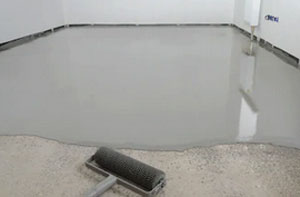
A professional screeding contractor will also tell you if a structural engineer is necessary for your undertaking, in order to identify load bearing, point loadings and flex strength that your flooring might need to conform with current British Standards and building regulations.
Working with a skilled and highly trained specialist will ensure that you use the correct type of screed for the room's anticipated purpose and get the maximum lifespan out of your flooring. The correct blend of screed and the way it is laid is also crucial to guarantee the final durability of your floor.
There are a number of screeding contractors in and around Adwick-le-Street so see if you can get multiple quotes for your floor screeding project before choosing a company and know to what standard of finish it's for. The SR (Surface Regularity) finish is the figure to look for when receiving a quote from your Adwick-le-Street screeding contractor. Each of the three SR levels provide different standards of finish, with SR1 offering the highest, with the smallest amount of deviation over the surface area. This means that you may have to fix any areas that may cause issues when laying your finished flooring material.
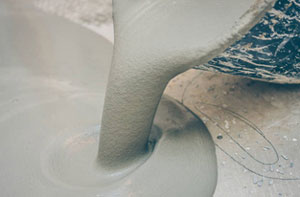
The regulations and guidelines set out in in the British Standards BS8204 must be observed by all Adwick-le-Street floor screeding companies and they must also hold accreditation with the manufacturers of any specialist screeding materials (Cemfloor, Gypsol, Flowcrete etc.) to demonstrate their safe working practices and competence. The assessment and training of a screeding contractor by such manufacturers is underlined through this accreditation scheme, and guarantees reliability and safe working practices on any screeding project which involves their materials.
For the screeding of floors in schools, pubs, shops, factories, hospitals and warehouses, skilled Adwick-le-Street commercial screeders will be required.
TYPES OF SCREED
Standard Screeds - This is ideal for basic domestic usage and comprises a mixture of sand and cement. Five parts sand to one part cement is the typical mixture for standard flooring screeds. Once laid this 5:1 ratio dries at a rate of 1mm each day.
Liquid or Self-Levelling Screeds - A latex and cement material which can produce the highest standard of finish to SR1 levels. It is mainly used to provide a high quality floor over a poor quality or damaged substrate and results in a finish onto which all types of flooring materials can be laid. Even with a depth of one millimetre, the latex polymers within the mixture provide a high strength surface for a variety of uses.
Fibre Reinforced Screed - The expert's choice for domestic use on top of under floor heating. The fibres in this screed mix improve overall strength and durability whilst also protecting against thermal shrinkage and cracking. It sets at the same rate as a standard screed of 1mm per day.
Industrial and Heavy Duty Screed - Where levels of traffic are expected to be high or heavy loading of the floor is required, heavy duty screeds offer maximum durability and strength.
Polymer Screeds - A high strength flooring solution where a reduced screed thickness is essential. Due to their different chemical compositions, these have varying setting times which can be verified by reading manufacturer's guidelines.
Advanced Drying and Fast Drying Screeds - If there's a need to use the area in question as quickly as possible a fast drying screed may be used. The vast majority of the fast or advanced drying screeds are of the fibre reinforced kind and are appropriate for a whole host of flooring projects where the faster curing rate of three to seven millimetres is a big advantage.
SCREEDING PREPARATION AND INSTALLATION
Screeding companies will need to prepare all areas prior to any other work so as to ensure a hard wearing and quality screed flooring. The original floor surfaces should be cleaned to eradicate any grease, paint, debris and oil which might affect the adhesion of the screed.
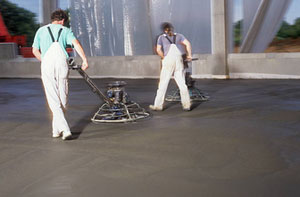
Any cleansing products used during this process shouldn't leave any residues, and the floor surface must be permitted to dry out naturally. If screeding over a cement or stone floor any cracks should be mended to stop them from "travelling" through the screed layer and resulting in imperfections on the final floor surface. During a site survey your Adwick-le-Street screeding installer will ascertain what preparation work is required before starting to work on screeding the floor.
Before the screeding can be poured a damp proof membrane (DPM) will have to be put down to protect the screed and final flooring from moisture. There could be 2 or 3 layers of varying thicknesses of polythene to act as a barrier between the screed and the insulation layer.
If the area where you live is at risk from radon then another barrier is necessary to prevent this harmful gas from entering via the ground. If radon gas occurs in large amounts then a complete ventilation and extraction system might be needed beneath the layer of screed which will remove any gases that are seeping in from ground level.
As soon as these steps have been taken the screeding company will apply a sealant or primer to the prepared base. Primers assist with the bonding process and are specialist applications according to the kind of screed that's being used. Due to their special nature, only certified screeders in Adwick-le-Street are capable of using them correctly, safely and using equipment which is made for the task.
If required, this is the time that under floor heating can be laid out in the correct manner and installed. The cabling and heating pipes are firmly mounted on insulation panels to stop any movement and make sure they are held in the correct position. Warmth is evenly spread across a floor area in a properly installed underfloor heating system, and in conjunction with it being an effective method of heating, it's an excellent choice for the majority of Adwick-le-Street home renovation projects.
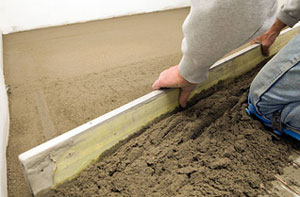
The screed can now be prepared in situ and poured onto the base. Your proposed use of the room will assist the screeding company on which form of screed is best for your needs. For quick drying and advanced screeds there will be at least 24 hours delay before it can be walked over, and a further seventy two hours minimum before any flooring material can be fitted. If you're using standard or heavy duty screeds the curing time is increased and the manufacturer's guidelines must be adhered to so as to get the best possible finish for your floor.
As soon as the screeding has solidified it can be checked for quality to determine its SR level. Using a 2 metre straight-edge the surface is checked for any deviations, ridges and dips in the surface of the screed.
- SR1 - Over the whole area, if there are no deviations greater than three millimetres from the straight-edge, then you have a top level SR1 standard surface.
- SR2 - SR2 is for standard floors in industrial and commercial projects and can deviate from the straight-edge by as much as 5 millimetres.
- SR3 - SR3 is basic utility standard where a quality finish isn't needed. This level can have a maximum permissible deviation of 10 millimetres.
If your screed has been laid with particular load bearing requirements in mind then a structural engineer is going to be needed to perform the assessment. Using specialist equipment the engineer will verify the screeding strength and its suitability for use in a load bearing setting. This will include a drop hammer test which assesses various aspects of the flexibility and strength of the screed. Only experienced structural engineers obeying the BS8204 regulations are permitted to conduct these tests and sign off on the structural safety of the screeding. (Tags: Floor Screeding Adwick-le-Street, Floor Screeding Services Adwick-le-Street, Floor Screed Adwick-le-Street, Screeding Adwick-le-Street).
Floor screeding services are available in Adwick-le-Street and also in nearby places like: Scawsby, Toll Bar, Skelbrooke, Burghwallis, Highfields, Shaftholme, Hampole, Hooton Pagnell, Trumfleet, Skellow, Holme, Almholme, Brodsworth, Arksey, Woodlands, Askern, Campsall, Carcroft, Hickleton, Pickburn, and in these postcodes DN6 7BY, DN6 7TX, DN6 7DU, DN6 7BF, DN6 7DF, DN6 8DB, DN6 8DE, DN6 7UY, DN6 7BD, and DN6. Locally based Adwick-le-Street floor screeders will probably have the postcode DN6 and the telephone dialling code 01302. Verifying this should make sure that you're accessing local floor screeding. Adwick-le-Street householders will be able to benefit from these and countless other comparable services. If you want to obtain a quotation for screeding services, this can easily be accomplished by clicking on the "Quote" banner.
Granolithic Screeding
Granolithic screeding is used to create robust and durable surfaces, which are often necessary in industrial and commercial spaces in Adwick-le-Street. Granolithic screeding is a mixture of cement, sand, and fine aggregate, like granite or other hard stones, giving it extra strength and resilience compared to standard concrete. This type of screed is especially useful in areas with heavy traffic or machinery, as it effectively resists wear and tear.
The process of installation includes placing the granolithic screed on a prepared base, often a concrete subfloor. The screed is compacted and levelled with care to achieve a smooth, even surface that can endure heavy use. Not only does it offer durability, but a polished finish can also be applied, creating an attractive, smooth surface suitable for high-traffic areas like warehouses or workshops in Adwick-le-Street.
Granolithic screeding is prized not only for its strength but also for its cost-efficiency. It requires very little maintenance once laid and has the potential to last for many years, rendering it a practical choice for spaces in both the industrial and commercial sectors. For factories, loading bays, or even large residential garages, granolithic screeding offers a durable flooring solution. (Tags: Granolithic Screeding Adwick-le-Street)
Latex Floor Screeds
To prepare for final floor coverings, latex floor screeds are widely used to achieve smooth, level surfaces. By mixing cement with latex, these screeds become flexible and easy to apply. Ideal for use on uneven or cracked floors, the latex in the screed ensures good adhesion and prevents cracking.
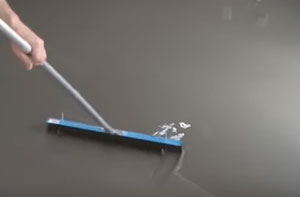
The application of latex floor screeds is a relatively simple process. Initially, the existing floor needs to be cleaned and primed to guarantee good adhesion. The next step involves pouring the screed mixture onto the floor and spreading it evenly with a trowel. Once the mixture has dried, it creates a level, smooth surface suitable for tiles, vinyl, or other floor coverings.
Latex floor screeds are advantageous due to their fast drying time. Traditional screeds take days to dry, but latex screeds can be walked on after only a few hours. This makes them an excellent choice for both commercial and domestic projects in Adwick-le-Street, where time is often a critical factor. (Latex Floor Screeds)
Polished Screeds Adwick-le-Street
For Adwick-le-Street homeowners desiring a sleek and modern flooring solution, polished screeds have emerged as a popular choice. Providing a robust and attractive foundation for different living areas, these floor screeds feature an even, trowel-finished surface. Shiny perfection is the end result of this visually impactful and functional flooring technique. It involves laying a cement-based material first, followed by polishing it to achieve the preferred finish.
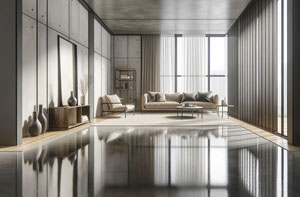
The low maintenance nature of polished screeds contributes to a reduction in maintenance. Polished screeds, unlike typical flooring alternatives, don't need to be sealed or waxed frequently. With a seamless, smooth surface that resists dust and allergens, they are an excellent option for those suffering from allergies or asthma. Additionally, the high wear resistance of polished screed floors ensures their longevity, thereby lowering the likelihood of needing expensive replacements and repairs in the future.
Polished screed floors offer home and property owners in Adwick-le-Street the added benefit of flexibility. To achieve a cohesive aesthetic, polished screeds come in a wide range of finishes and colours, allowing them to adapt to any interior decor or design theme. Polished screeds can elevate the overall appearance of a home, regardless of whether you opt for a minimalist look or a more elaborate pattern. In addition to this, a more inviting and spacious atmosphere can be created by their mirror-like surface which can help brighten up rooms by maximising the impact of natural light. (Polished Screed Flooring Adwick-le-Street)
Acid Etching Concrete Adwick-le-Street
Preparing concrete surfaces for finishing sometimes involves the process of acid etching. The process involves applying an water and acid solution to the concrete to clean and roughen the surface. This process improves the adherence of the sealant or new coating, guaranteeing a more durable and long-lasting finish.
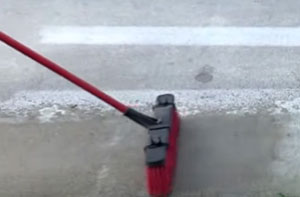
The process commences with a meticulous cleaning of the concrete surface to eliminate grease, dirt and debris. After cleaning the surface, the acid solution is applied evenly to the concrete. The concrete develops a slightly rough texture due to the acid reaction, which is ideal for bonding with paints, sealants, or other products.
It is crucial to prioritise safety when acid etching concrete, given the hazardous nature of the acid. Wearing protective gear, such as goggles, gloves, and a mask, is crucial to prevent contact with the skin and eyes. For best results, have a professional take care of it.
To neutralise the acid and remove remaining residue, the concrete is thoroughly rinsed with water after the acid has done its job. The concrete is now prepared for the next step, which could be painting, staining or sealing. (Acid Etching Concrete Adwick-le-Street)
Screed Floor Removal Adwick-le-Street
Construction and renovation often require screed floor removal. This is the process of stripping away existing layers of screed from floor surfaces. This procedure is essential for the upgrading or refurbishing of a floor. It prepares the surface for the new flooring material or other improvements.
The removal of screed floors is an complex task that should only be attempted by specialist contractors who have the necessary expertise. The old screeding can be eliminated safely and successfully thanks to their proficiency, preparing the way for a fresh start for the floor. Whether it is for repairs, changes in design or upgrades, this fresh start holds great value.
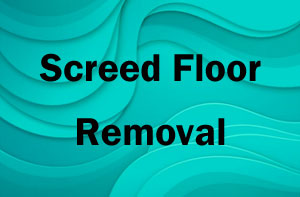
Removing a screed floor requires specialist techniques and equipment, adapted to the particular job. To proceed, one must carefully assess the existing screed type, thickness, and the surface it's being installed on. Careful attention to detail during removal ensures effective removal with minimal damage to the underlying structure.
One of the primary benefits of screed removal is the opportunity it provides to address any underlying issues that might have developed over the years. A thorough evaluation of the underlayer is possible only after removing the old screed layer, if it's uneven, damaged, or otherwise compromised. This inspection is essential for ensuring that any structural challenges are addressed before new flooring materials are applied.
In addition, screed floor removal is a major preparatory step for implementing an underfloor heating system in Adwick-le-Street. To install heating elements successfully, contractors first ensure a level and clean surface by removing the pre-existing screed. This establishes a pathway for a highly efficient and effective underfloor heating setup, which enhances the overall energy efficiency and comfort of the space.
The removal of screed flooring adheres to sustainability principles, focusing on waste reduction and reusability. Oftentimes, extracted screed gets a fresh start by being repurposed or recycled in other construction projects, minimising the impact on the environment.
To conclude, the removal of screed floors is a crucial and complicated process in the field of renovation and construction. Navigating the complexities of removing old layers of screed while ensuring the integrity and safety of the underpinning structure requires the expertise of professional flooring contractors. In a number of different settings in Adwick-le-Street, screed floor removal contributes to the creation of efficient, hard-wearing, and aesthetically pleasing flooring solutions by enabling a fresh start for the floor. (10101 - Screed Removal Adwick-le-Street)
Adwick-le-Street Screeding Related Tasks

There are a whole host of tasks that can be carried out by your local Adwick-le-Street floor screeding company including screeding quotes in Adwick-le-Street, granolithic floor screed , resin floor screeds, acid etching concrete, floor screeding advice, coloured floor screeding, screed floor removal, damp proof membranes, screeding repairs in Adwick-le-Street, concrete toppings, unbonded screed, bonded screed, substrate floor preparation, screed flooring, garage screeding, screed reinforcement, smoothing compounds, underfloor heating installation, concrete screed, sand and cement floor screeding, fibre reinforced floor screeding, lightweight floor screeding, warehouse floor screeding, self-levelling floor screeding, final floor finishes, professional floor levelling services, floor screeding tools, external screeding, bonded concrete floor screeding, pumped floor screeds, and more floor screeding tasks. Listed are just a handful of the activities that are undertaken by those specialising in screeding. Adwick-le-Street professionals will inform you of their full range of screeding services.
Floor Screeding Near Adwick-le-Street
Also find: Hooton Pagnell floor screeding, Highfields floor screeding, Holme floor screeding, Hickleton floor screeding, Shaftholme floor screeding, Almholme floor screeding, Skellow floor screeding, Skelbrooke floor screeding, Askern floor screeding, Pickburn floor screeding, Arksey floor screeding, Scawsby floor screeding, Toll Bar floor screeding, Carcroft floor screeding, Campsall floor screeding, Trumfleet floor screeding, Brodsworth floor screeding, Burghwallis floor screeding, Woodlands floor screeding, Hampole floor screeding and more. These and other locations are serviced by screeding specialists and related tradesmen. Well-equipped with the necessary expertise and know-how, these competent specialists excel in delivering the best quality flooring solutions. Skilled in the art of screeding, they ensure exceptional quality work, whether it's for domestic or commercial properties. For local residents seeking screeding services, it's a quick and simple process to gather information and obtain quotes. All you need to do is click here. Today is the perfect time to kick off your floor screeding project.
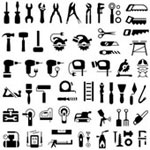
Other Trades Adwick-le-Street: Okay, so you are currently trying to find floor screeding in Adwick-le-Street, however you may also require linoleum flooring in Adwick-le-Street, a roofing contractor in Adwick-le-Street, parquet flooring in Adwick-le-Street, a stonemason in Adwick-le-Street, an electrician in Adwick-le-Street, a building contractor in Adwick-le-Street, partition walling in Adwick-le-Street, a carpenter/joiner in Adwick-le-Street, a plasterer/renderer in Adwick-le-Street, an underfloor heating specialist in Adwick-le-Street, a carpet layer in Adwick-le-Street, a handyperson in Adwick-le-Street, SKIP HIRE Adwick-le-Street, when undertaking any home improvement work in Adwick-le-Street. Simply click the highlighted links to send in enquiries and get estimates.
More: Floor Levelling Services, Commercial Screeding, Self-Levelling Screeds, Screeding, Screeding Specialists, Screeding Services, Polished Screeding, Commercial Screeding, Residential Screeding, Screeding Companies, Polished Screeding, Screeding, Commercial Screeding, Screeding Companies, Coloured Screeding, Screeding Companies, Screeding Contractors, Residential Screeding, Screed Floors, Screeding Specialists, Floor Levelling, Floor Levelling Services, Screeding Contractors, Flooring Contractors, Cheap Floor Screeding, Floor Screeding, Cheap Floor Screeding, Screeding, Coloured Screeding, Floor Screeders, Screed Floors, Screed Floors, Screeding, Residential Screeding, Driveway Installation, Driveway Installation, Driveway Installation.
TOP - Floor Screeding Adwick-le-Street
Floor Screeding Estimates Adwick-le-Street - Floor Screeding Near Me - Floor Levelling Adwick-le-Street - Domestic Screeding Adwick-le-Street - Floor Screeding Adwick-le-Street - Self-Levelling Screeding Adwick-le-Street - Screeding Services Adwick-le-Street - Screeders Adwick-le-Street - Floor Screed Companies Adwick-le-Street


